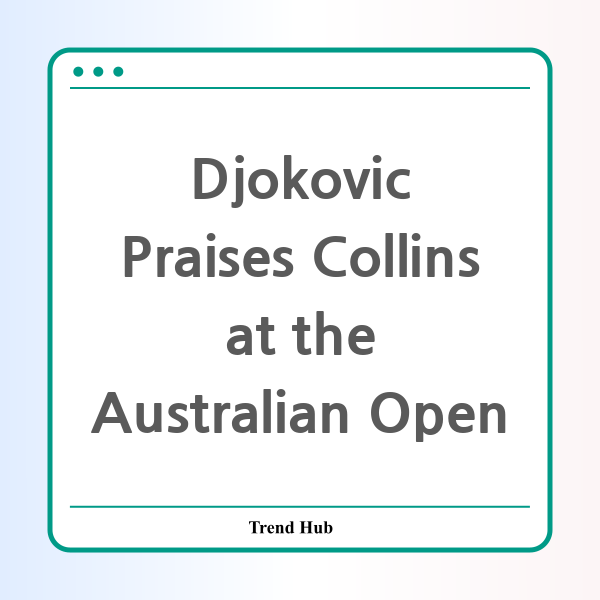* This website participates in the Amazon Affiliate Program and earns from qualifying purchases.

The Australian Open has become a battleground, not just for tennis supremacy, but for the fiery exchanges between players and fans. Recently, Novak Djokovic publicly admired Danielle Collins for her bold reaction to hecklers during her match in Melbourne. This interaction didn’t just highlight the competitive nature of tennis; it unveiled the deeper emotions players experience when faced with intense crowd dynamics.
Collins, who is not afraid to stir the pot, faced a vociferous crowd while playing against Australia’s own Destanee Aiava. After a hard-fought match that ended 7-6 (7/4), 4-6, 6-2, Collins addressed the crowd with a mix of bravado and humor. "Thank you for paying my bills," she sarcastically remarked, flipping the negative energy on its head. Her reaction was not only clever but also highlighted a fascinating aspect of professional sports: the significance of crowd support, or the lack thereof, can directly affect an athlete's performance.
Djokovic, who is no stranger to crowd controversy himself, managed to find solidarity with Collins. Having recently dealt with hecklers after his own victory, the Serbian champion expressed admiration for Collins’ handling of the situation. He described her response as “funny” and “smart,” indicating a sense of kinship among athletes who have faced similar challenges. “Big fan of Danielle Collins after that,” Djokovic stated, establishing a mutual respect among players navigating the pressures of public opinion on the grand stage of the Australian Open.
What makes Collins’ approach particularly intriguing is her ability to transform the hostility of the crowd into motivation. She articulated a powerful sentiment, remarking that the fans who may dislike her are still contributing to her earnings. This perspective reveals an astute understanding of the business aspect of sports, where every ticket sold, regardless of fan sentiment, ultimately contributes to an athlete’s financial success. “Every person that’s bought a ticket to heckle me, it’s all going toward the Danielle Collins’ fund,” she quipped, showing her resilience and ability to thrive under pressure.
This exchange between Djokovic and Collins raises the question: How do athletes balance personal emotions against external pressures from audiences? In a high-stakes environment like the Australian Open, the roar of the crowd can either uplift or diminish players' spirits. Djokovic’s admission of feeling “very hot-headed” after a contentious match against Tomas Machac speaks to the intense psychological environment athletes navigate. While he managed to restrain his emotions on the court, it is clear that the interplay between athlete and audience is complex and multifaceted.
As the Australian Open continues, fans can expect more thrilling matches characterized by drama both on and off the court. The stories of athletes like Djokovic and Collins serve as a reminder of the human element in sports. Their experiences shape the narrative of this prestigious tournament, as they both try to excel while dealing with the often unpredictable nature of fan engagement.
Ultimately, the ongoing saga of the Australian Open embodies the spirit of competition, resilience, and the fascinating dynamics between athletes and their audiences. As we watch these Olympians battle it out for glory, we also see a glimpse into their personalities, their strategies for coping with pressure, and their ability to turn adversity into triumph.
* This website participates in the Amazon Affiliate Program and earns from qualifying purchases.